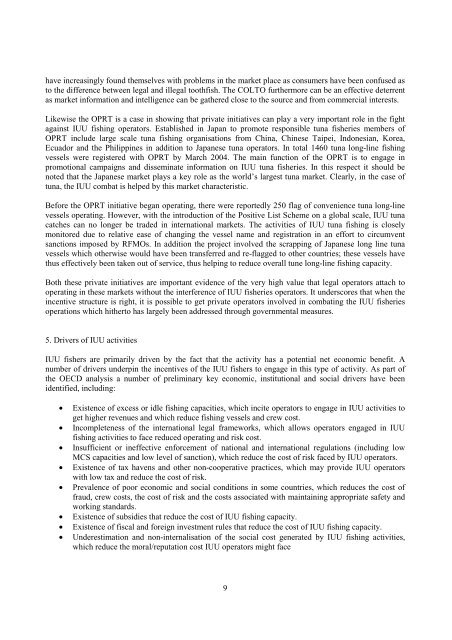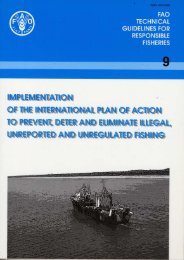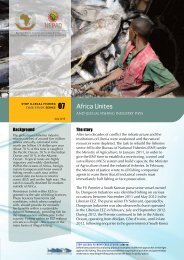1 Addressing Illegal, Unreported and Unregulated (IUU ... - OECD
1 Addressing Illegal, Unreported and Unregulated (IUU ... - OECD
1 Addressing Illegal, Unreported and Unregulated (IUU ... - OECD
You also want an ePaper? Increase the reach of your titles
YUMPU automatically turns print PDFs into web optimized ePapers that Google loves.
have increasingly found themselves with problems in the market place as consumers have been confused asto the difference between legal <strong>and</strong> illegal toothfish. The COLTO furthermore can be an effective deterrentas market information <strong>and</strong> intelligence can be gathered close to the source <strong>and</strong> from commercial interests.Likewise the OPRT is a case in showing that private initiatives can play a very important role in the fightagainst <strong>IUU</strong> fishing operators. Established in Japan to promote responsible tuna fisheries members ofOPRT include large scale tuna fishing organisations from China, Chinese Taipei, Indonesian, Korea,Ecuador <strong>and</strong> the Philippines in addition to Japanese tuna operators. In total 1460 tuna long-line fishingvessels were registered with OPRT by March 2004. The main function of the OPRT is to engage inpromotional campaigns <strong>and</strong> disseminate information on <strong>IUU</strong> tuna fisheries. In this respect it should benoted that the Japanese market plays a key role as the world’s largest tuna market. Clearly, in the case oftuna, the <strong>IUU</strong> combat is helped by this market characteristic.Before the OPRT initiative began operating, there were reportedly 250 flag of convenience tuna long-linevessels operating. However, with the introduction of the Positive List Scheme on a global scale, <strong>IUU</strong> tunacatches can no longer be traded in international markets. The activities of <strong>IUU</strong> tuna fishing is closelymonitored due to relative ease of changing the vessel name <strong>and</strong> registration in an effort to circumventsanctions imposed by RFMOs. In addition the project involved the scrapping of Japanese long line tunavessels which otherwise would have been transferred <strong>and</strong> re-flagged to other countries; these vessels havethus effectively been taken out of service, thus helping to reduce overall tune long-line fishing capacity.Both these private initiatives are important evidence of the very high value that legal operators attach tooperating in these markets without the interference of <strong>IUU</strong> fisheries operators. It underscores that when theincentive structure is right, it is possible to get private operators involved in combating the <strong>IUU</strong> fisheriesoperations which hitherto has largely been addressed through governmental measures.5. Drivers of <strong>IUU</strong> activities<strong>IUU</strong> fishers are primarily driven by the fact that the activity has a potential net economic benefit. Anumber of drivers underpin the incentives of the <strong>IUU</strong> fishers to engage in this type of activity. As part ofthe <strong>OECD</strong> analysis a number of preliminary key economic, institutional <strong>and</strong> social drivers have beenidentified, including:xxxxxxxxExistence of excess or idle fishing capacities, which incite operators to engage in <strong>IUU</strong> activities toget higher revenues <strong>and</strong> which reduce fishing vessels <strong>and</strong> crew cost.Incompleteness of the international legal frameworks, which allows operators engaged in <strong>IUU</strong>fishing activities to face reduced operating <strong>and</strong> risk cost.Insufficient or ineffective enforcement of national <strong>and</strong> international regulations (including lowMCS capacities <strong>and</strong> low level of sanction), which reduce the cost of risk faced by <strong>IUU</strong> operators.Existence of tax havens <strong>and</strong> other non-cooperative practices, which may provide <strong>IUU</strong> operatorswith low tax <strong>and</strong> reduce the cost of risk.Prevalence of poor economic <strong>and</strong> social conditions in some countries, which reduces the cost offraud, crew costs, the cost of risk <strong>and</strong> the costs associated with maintaining appropriate safety <strong>and</strong>working st<strong>and</strong>ards.Existence of subsidies that reduce the cost of <strong>IUU</strong> fishing capacity.Existence of fiscal <strong>and</strong> foreign investment rules that reduce the cost of <strong>IUU</strong> fishing capacity.Underestimation <strong>and</strong> non-internalisation of the social cost generated by <strong>IUU</strong> fishing activities,which reduce the moral/reputation cost <strong>IUU</strong> operators might face9
















